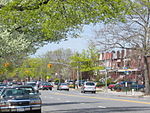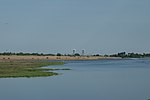Jans Martense Schenck house

The Jan Martense Schenck house was built by Jan Martense Schenck (1631 in Amersfoort, Utrecht, Netherlands – August 27, 1687), a settler of New Netherland, within what is now the Mill Basin section of Brooklyn, New York City. Believed to be one of New York City's oldest houses, the structure was later moved to the Brooklyn Museum, where it is used as a public exhibit. In 1675, Schenck bought a parcel of land on Molen Eylandt (Mill Island) in the Dutch town of Nieuw Amersfoort (now Flatlands), and his family owned the house for over a century. The area around the old house started to become heavily developed in the 1920s. In 1952, the Brooklyn Museum made a commitment to save the house, dismantled it, and stored it for about ten years until plans to install it in the Brooklyn Museum were finalized. The house was opened to the public in 1964.
Excerpt from the Wikipedia article Jans Martense Schenck house (License: CC BY-SA 3.0, Authors, Images).Jans Martense Schenck house
Avenue U, New York Brooklyn
Geographical coordinates (GPS) Address Nearby Places Show on map
Geographical coordinates (GPS)
| Latitude | Longitude |
|---|---|
| N 40.615555555556 ° | E -73.912111111111 ° |
Address
Public School 236
Avenue U 6302
11234 New York, Brooklyn
New York, United States
Open on Google Maps










